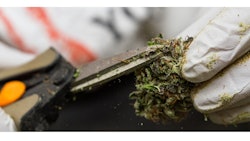

Cannabis culture, until recent years, has thrived off a tongue-in-cheek, alternative vibe, and there’s no better example of that than the industry’s long history of outlandish strain names. Some are fairly innocuous (Grand Daddy Purp sounds like a friendly, old neighbor); others are a bit more in-your-face (some Chernobyl, anyone?); and a few wink at other famous brands (may the force be with you if you choose Skywalker OG).
But recent history has shown that parodying other well-known companies can land you in hot water. Just ask the team at GG Strains, the creators of GG4 (formerly known as Gorilla Glue #4). In 2017, GG Strains received a letter from the Gorilla Glue adhesive company summoning the cannabis company to federal court for trademark violations. (For more on this lawsuit, and its outcome, read "Gorilla Glue vs. Gorilla Glue" in the November 2017 issue of Cannabis Business Times.)
“Our attorney fees we’ll be paying off probably until our grandchildren are born,” says Catherine Franklin, GG Strains’ director of marketing, chief digital officer and cultivator liaison. She estimates the costs in the tens of thousands, and rising. “People don’t realize that a federal lawyer is more than $500 an hour. Each email is minimum of one hour.”
GG Strains is in the middle of a large-scale rebranding and education effort to inform its partners and consumers about the strain renaming. Since the lawsuit, Franklin says she has spent the bulk of her time building a social media campaign and calling dispensaries directly to make sure they know about the new name—and how the dispensary (and GG Strains) could face another federal lawsuit should it continue to flout the terms of the settlement reached between GG Strains and the adhesive company.
While training budtenders can be a hassle thanks to the high turnover rate in that position, all of GG Strains’ partners have been responsive to the notice.
“We haven’t gotten any pushback from our partners,” says Ross Johnson, GG Strains’ co-founder and the co-creator of GG4. “But just the other day we posted something that said ‘GG4/Original Glue’ and someone came in and said, ‘I’ll always call it Gorilla Glue.’ So you have those people that are aware of the name change, but want to buck the system.”
Johnson and Franklin have heard reports and received calls from businesses that have continued to use the old moniker or are not carriers of the certified GG4 strain (but rather carry unofficial strains from other breeders) about receiving cease-and-desist letters from the adhesive company. But companies aren’t obligated to send cease-and-desist letters warning cannabis companies about the trademark violation; instead, they can move the matter directly into federal court, as in GG Strains’ case. When that happens, cannabis breeders basically lose control over their business decisions.
“The moment you get hit with that cease-and-desist, or in our case that straight federal lawsuit … you don’t have an option to rename,” Franklin explains. “Whoever is suing you or is asking you to cease-and-desist, they now have to partake in your renaming and your rebranding, and you don’t want that because they don’t want the best interests for you.”
For this reason, cannabis entertainment and education website Leafly decided to review its cannabis strain database and rename the varieties that could be potential targets for a trademark violation suit. The company announced the decision in a May 4 article titled, “Trademarks in Cannabis: Where Did All the ‘Star Wars’ Strains Go?” Leafly has rebranded strains like Skywalker OG and Ewok to Mazar x Blueberry OG and Alien Walker, respectively, on its website.
“We know that there’s been issues with trademarks in the past with strains like Gorilla Glue and Girl Scout Cookies,” says Bailey Rahn, a Leafly editor, in an interview with CBT. “We took a preventative approach with some names that could cause the same situation.”
Deserae Weitmann, Leafly’s corporate counsel, added that the company also reviewed its database for names that could appeal to children. “We want to be the best actors in the space,” she says.
But Leafly is taking a more direct role in the retail side of the industry, adding a more robust shopping layer to its website. Leafly now offers “Leafly Pickup,” allowing customers to make reservations of products online, skip the line, and quickly pay for and pick up their reservations at partnering dispensaries.
“With that kind of change to monetization of product in the website, the risk profile definitely changes a bit from just a publisher of information to a more commercial use of that information,” Weitmann explains.

Friend Turned Foe
Renaming strains is a good way to avoid a trademark lawsuit, but it’s also important that all products are named correctly to avoid a lawsuit from the consumer, Franklin warns. That’s because selling a product under a different or false name is the textbook definition of consumer fraud. She predicts the industry is about to see a flurry of such lawsuits, especially as genetic testing services become more popular.
“Somebody could say, ‘I can make a quick million dollars by walking in that dispensary tomorrow and getting something that is not real.’ It costs them $199 to test it, and they can turn that into a million-dollar lawsuit. Consumers like those lawsuits. And that’s what this industry doesn’t think [about],” Franklin says.
David G. Evans, a New Jersey-based personal injury attorney, is one litigator who is examining the cannabis industry for a list of potential lawsuits, including consumer fraud, he tells Cannabis Business Times. At press time, Evans was scheduled to participate in a webinar for lawyers titled, “Effectively Suing the Cannabis & Marijuana Industry” in late June. He says consumer fraud lawsuits can see plaintiffs awarded hundreds of thousands, if not millions of dollars, with the biggest judgments coming in cases involving medical patients. Simple mistakes such as selling a mislabeled product could qualify as consumer fraud, depending on state consumer protection laws.
“There’s also some federal laws regarding that, particularly with medicine,” Evans says. “The Federal Food and Drug Act has laws about misbranding and things like that, where if you make false statements about a product, or misrepresent a product, you can be sued for consumer fraud, for misrepresentation.”
Unscrupulous cultivators will sometimes rename strains to benefit from regional trends, Johnson says. For example, if OG Kush is popular in one city, consumers can expect dispensaries to be flooded with OG Kush or other renamed OG varieties looking to cash in on the rush.
Evans says those cases could easily qualify as consumer fraud, among various other charges that could be brought. “That could be a misrepresentation. It could be a breach of contract, a breach of warranty. It could be considered a failure to warn because you’re not warning the person about the accurate picture of that particular strain of marijuana,” he says.
“People are sue-happy in California,” Johnson warns. “They’re figuring it out, and the dispensaries are going to be caught with their pants down because they didn’t do the simple certification through the cultivators they’re buying product from before putting it on the shelves.”
Protect Yourself
While lawsuits can come from both consumers and corporations, cannabis businesses can minimize the damages. That said, options are limited once you receive a cease-and-desist letter, Johnson says. “You either abide by what the letter says, or the attorneys work out a deal, or you go to a lawsuit.”
Franklin explains that, typically, cease-and-desist letters will ask that you immediately stop violating the trademark and show proof that you have done so. The best course of action when you receive a cease-and-desist letter is to simply “fix it, call them, say you’re sorry and move on,” she says, adding that, “if you need to get an attorney, get an attorney and call them and find out what’s the time frame [they are] giving to change this without having a lawsuit.”
To create new names when it underwent its internal strain-rebranding process, Leafly reached out to the original breeders to “give them an opportunity to change it on their end so it could be unanimous across the industry,” Rahn says. When breeder information was not known, she notes, “we made our best judgment call of what the new name should be,” often falling back on parent combinations when a suitable alternative wasn’t available (such as with Skywalker OG becoming Mazar x Blueberry OG).
Standardization is the industry’s best line of defense, and while genetic testing can be used against the industry in consumer fraud lawsuits, requiring testing would add a layer of protection to the entire industry, according to Franklin. She says all products need to have their genetic makeup tested to confirm what strain it is “before it ever gets labeled and before it gets put on a shelf for a consumer to pay a price and pay taxes on it, period.” Breeders should register their genetics with Phylos Bioscience or Tru-Breed, and dispensary owners should require paperwork proving their orders’ genetics, she advises.
If you’re going to create a strain, think ahead and check for trademarks and intellectual property, Johnson says. “When GG4 was named as a parody, we never thought it would be as popular as it was. Never in our wildest dreams did we think this was going to be in the top-3 strains in the world. We would have never named it that.”
Ultimately, an ounce of prevention is worth a pound of cure because, as Johnson rightly summarizes, “if I got a letter from Disney, I’d be shaking in my boots.”

























